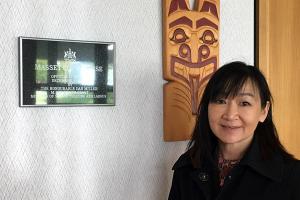
Jennifer Chow is the incumbent vice-president and upcoming president of the British Columbia Branch of the Canadian Bar Association (“CBABC”). Significantly, she is the first visible minority to hold either of these positions, and is setting a milestone for equality and diversity in the legal profession. She is also the first Department of Justice (“DOJ”) lawyer to hold those positions.
Chow is the first in her family to be born in Canada. Her family emigrated from Hong Kong. Chow was born in Port Alberni, but shortly afterwards, she and her family moved to Vancouver where she has lived most of her life. Chow was raised with strong traditional Chinese cultural values and remembers going to Chinese school.
“I consider myself as being born between two cultures,” says Chow, “I like to think I represent the best of both worlds.”
Growing up, Chow dreamed of being a writer. She ultimately pursued undergraduate studies in political science and attended law school. After graduating with a bachelor of arts from Dalhousie University, Chow attended first-year law at Dalhousie and remembers being one of the few, if not the only, Asian Canadian students in that year.
After first-year at Dalhousie, Chow transferred to the University of British Columbia Faculty of Law.
“When I think back, law school was full of intellectually stimulating classes and smart people,” said Chow. “I remember long nights studying in classrooms and in the library and being amazed by the number of us who wanted to change the world through practicing law.”
Chow did not know right away that she wanted to be a litigator. Initially, Chow thought she was best suited to solicitor’s work, and she articled with a regional firm in Vancouver that specialized in this area. However, it was during articling that she realized – and was told – that she had the makings of a great litigator. With this in mind, Chow moved on to work with a boutique litigation firm, where her work included criminal and family law matters.
“My journey to law school was not necessarily planned and deliberate. Rather, a series of events brought me there, and that has been the same way with my career. Some people know exactly what they want to do and set out to do it, while others capitalize on what life brings them, but we all get to where we should be anyways.”
In 2002, Chow took a break to pursue a master’s in public administration at the University of Victoria. While completing her master’s degree, she joined the Department of Justice where she has practiced for the past 15 years. Chow specializes in aboriginal, constitutional, administrative and corporate-commercial litigation, and has worked on a number of landmark cases.
Having grown up shy, Chow admits she did not consider being a litigator until she articled. Chow admits that she now loves going to court, and has even been twice to the Supreme Court of Canada.
When asked about changes she has noticed throughout her career, Chow describes some of the diversity and gender issues in the legal profession.
“When I first started as a lawyer, I knew of no Asian role-models in the legal profession, especially female ones. I did not know of any Asian litigators. In my early practice, there were few prominent Asian leaders in the legal community,” Chow explains. “The work that the Law Society of Upper Canada and the Law Society of British Columbia have done with regards to women and diversity in the legal profession is admirable. We now see more women and visible minorities pursuing legal education and working in law. There has been a lot of progress, but there is still work to be done, especially with the retention of women lawyers.”
Chow’s dedication to ameliorating the equality and diversity issues in the legal profession is reflected in her community involvement. For instance, she chaired the CBABC Equality and Diversity Committee, championing self-identification among lawyers; was a member of the Law Society of British Columbia (“LSBC”) Equity and Diversity Committee; and was an executive member of the CBABC Women Lawyer’s Forum. Chow has also demonstrated a passion for contributing to the future of the legal profession. She has also volunteered as a moot court judge for the UBC Faculty of Law, instructed courses for the LSBC Professional Legal Training Course and Continuing Legal Education Society of British Columbia, and taught aboriginal law courses at the University of Victoria. In 2010, Chow received the CBABC’s Community Service Award in 2010.
Chow’s significant contributions to the community secured her election as vice-president for the CBABC for 2015. In 2016, she will become the president of the CBABC.
“I feel proud to be the first female visible minority to become the vice-president [of the CBABC],” says Chow. “I think that at some point in everyone’s career, you just want to give back and become a change agent in your community. I hope to be able to open more doors for other women and visible minorities in the legal profession.”
First published on April 16, 2019.